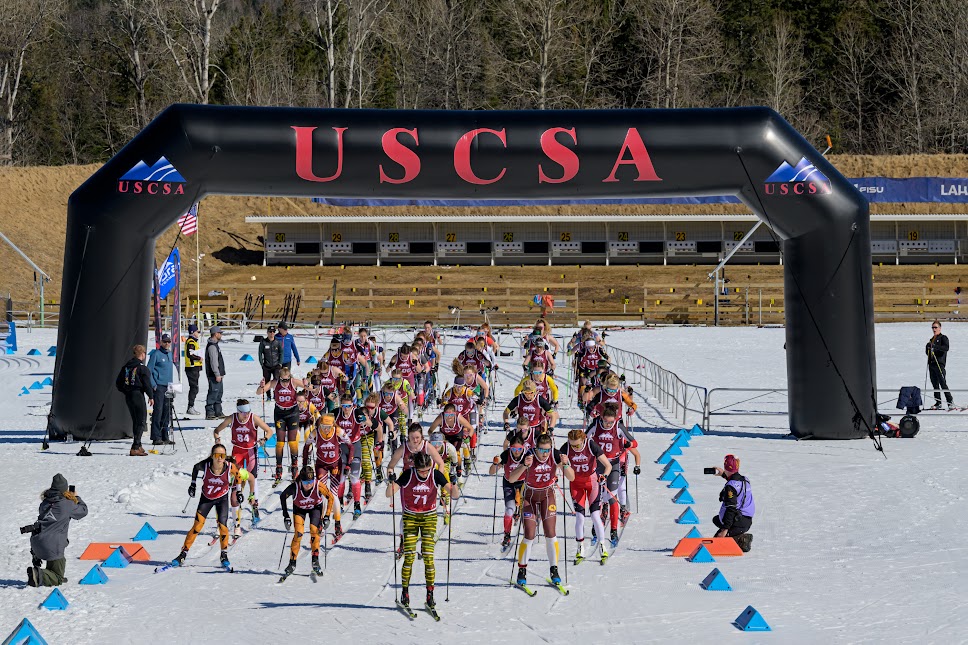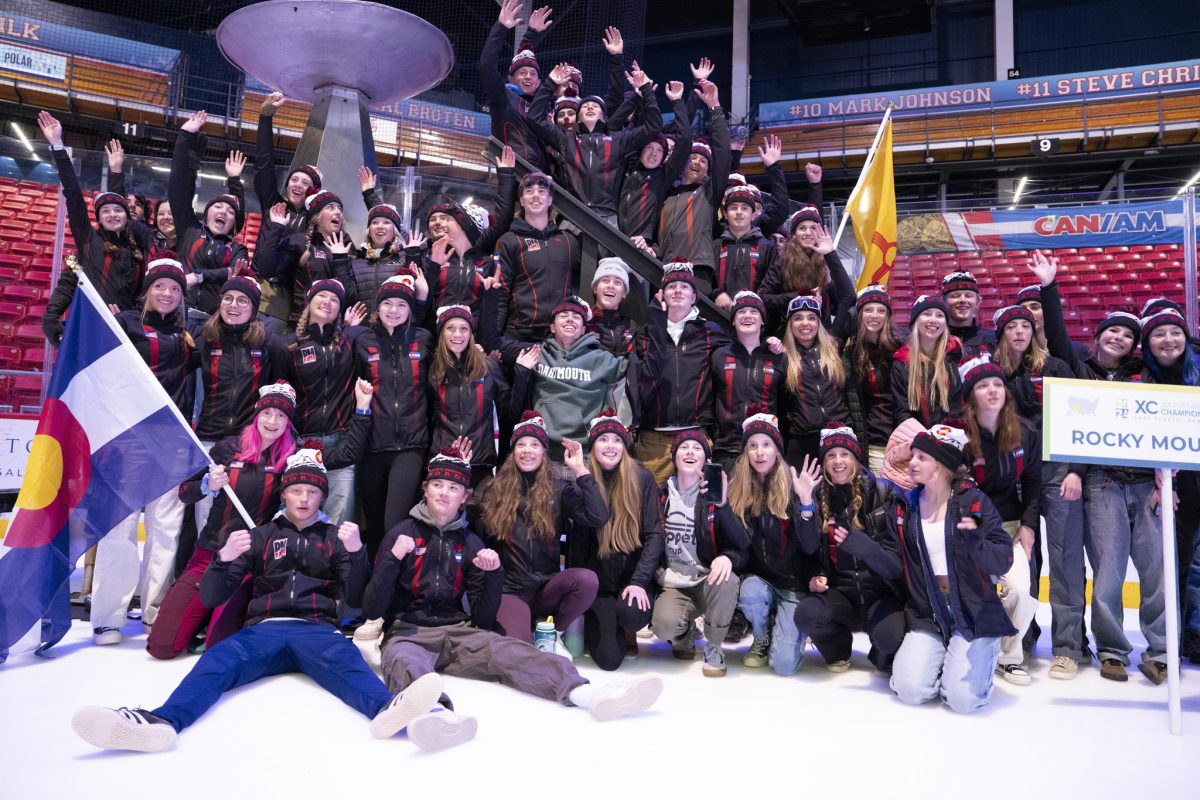Our recent series on biathletes facing the question of when and whether to go to college (parts one, two, and three) produced more interview material than we could fit into the three-part sequence, but we wanted to share a few more of the ideas with you anyway. What do biathletes do if they miss a target in a relay? They use a spare round. This week, we’re presenting you with short briefs on a few lingering topics.

In biathlon even more than in skiing, making the senior national team is crucial to an athlete’s success. Although the few clubs that support senior athletes – the Maine Winter Sports Center and the Craftsbury Green Racing Project – offer comprehensive support, the sheer lack of options outside of the national team can be limiting to an athlete’s ability to continue competing at the senior level.
So what happens to the athletes who remain dedicated, but don’t have national team resources at their disposal, and aren’t interested or able to join one of those two programs? We caught up with two of them: 20-year-old Raleigh Goessling, who recently left the Maine Winter Sports Center (MWSC), and 25-year-old Bill Bowler, a Development Team alumnus who had risen to the “B” squad but was left off of this year’s national team.
Goessling went straight from high school in Minnesota to MWSC, where he has trained for the last two years. In total, he’s made five trips to World Youth and Junior Championships, but the 2012 edition was actually one of his worst.
“Last season was tough,” Goessling wrote in an e-mail this spring. “It was the first time I had ever struggled for an entire season, not just a workout or a weekend.”
But after poring over his training logs, Goessling says he has discovered some of the reasons that his performances were disappointing. On his blog, Goessling wrote that one of the most important things he realized is that “training alone does not guarantee success.”
Yet, in a major change, that’s just what he will do – Goessling has left MWSC and will based out of Yarmouth Maine through at least this fall, where he will work with coach Bill Meyer. At that point, Goessling hopes to find a training group for the on-snow season. He anticipates starting school next summer, and has narrowed down a list of potential colleges.
“The transition from junior to senior for me will be tough logistically because I am not working with a club, and my results last season where well below national team standards,” Goessling explained.
Although he is leaving northern Maine, Goessling said that his decision to train there was perfect at the time: “I will be forever grateful to the coaches, organization, and most of all the community members who were there to help and support me during my first years out on my own in the big wide world,” he wrote on his blog. He says that the MWSC education is what gave him the tools to be able to now go solo.
“I was able to put in two very solid years of training, make some great industry contacts, and most importantly learn about myself and what I wanted to do,” he said. “By training independently I lose things like travel funding and race support, but I gain the flexibility to draw from many different points of view when planning my training and racing. I am planning on racing some regional cross county races and USBA IBU selection races. I’m excited to for the new season, and will use last season’s disappointment and frustration as motivation.”

Bowler, meanwhile, has left the country entirely and will be training primarily with the Canmore-based Biathlon Alberta Training Center; he faces many of the same challenges Goessling describes, and has a similar attitude towards overcoming them. The following is a transcript from an interview with Bowler in Bend, Oregon, several weeks ago.
FasterSkier: So what are you up to now?
Bill Bowler: It’s kind of crazy actually. I’m in Canmore now as my home base for training. I’m going to be between there, here in Bend, and a little bit in Park City. And then also a little bit back at home in Wisconsin. So it’s a big shift from being out East. I’m doing a lot more on my own.
FS: Are you working with any coach in particular?
BB: I’m pretty much self-coached at this point. I kind of like being my own boss and writing my own training plans and stuff. But I do work with the Biathlon Alberta Training Center, which is based in Canmore.
FS: So that’s with Richard Boruta?
BB: Yup, Richard. I shoot with those guys.
FS: Were they cool with having a non-Canadian come up there?
BB: Yeah, Richard has worked a lot with U.S. athletes in the past, like Wynn Roberts and Leif Nordgren when they were up there for Junior Worlds. So he was pretty cool about it.
FS: So were they excited to have another senior on their team? It seems like their senior program is small.
BB: Yeah, they have Zina Kocher, and then Melanie Schultz who is another top Canadian athlete. It’s a younger group – I mean, I’m 25 now, and a lot of the other athletes are 19 to 22 or 23. But it’s a good group to train with, and I do some workouts with the national team as well.
FS: Are the national team coaches still willing to work with athletes who are not on the national team?
BB: It’s a more welcoming community. And I know that when I come to these camps with the U.S. team, the coaches, Per Nilsson and Armin Auchentaller, will still help me out here and there.
FS: Was it a surprise for you not to get re-named?
BB: No, I saw the criteria and I knew that I didn’t quite meet it, so I wasn’t surprised. But it was kind of surprising to see the team shrink so much. It gets harder and harder to make it every year – it’s down to six guys now. In some ways that’s good because it makes you a little hungrier and a little more competitive. But it’s hard for developing athletes in a way, when you have to be on the team and off the team.
FS: Is it intimidating not to have a coach to rely on and bounce ideas off of?
BB: A little bit, but I’m confident in my ability to train myself. I was on my own a couple of years ago as well. And that was actually the year I took the big step up to get to the international level, was when I was training on my own. So obviously USBA is doing a great job of training athletes, and I feel like I did make improvements training under the system. But I’m also confident that I can call the shots and do what I need to do.
FS: In terms of training will you be following the same progression you were on there?
BB: Yeah, a little bit. I’m actually going to make this year a really big volume year, because I’ve never really done huge hours in the past. I’m going to try to do a lot this year and hopefully it will pay off in 2014. So that’s the goal. A lot of times with that training, if you put in a lot of hours one year you’ll get a little bit of the benefit that year but then it will be a big payoff later.
FS: So you’re definitely in until Sochi.
BB: I’m hoping so. At this point I am… the level of expectation is very high on the team. The men’s team is incredibly competitive right now, and just to break into that World Cup level, I’m prepared to take some really big risks to do it.



